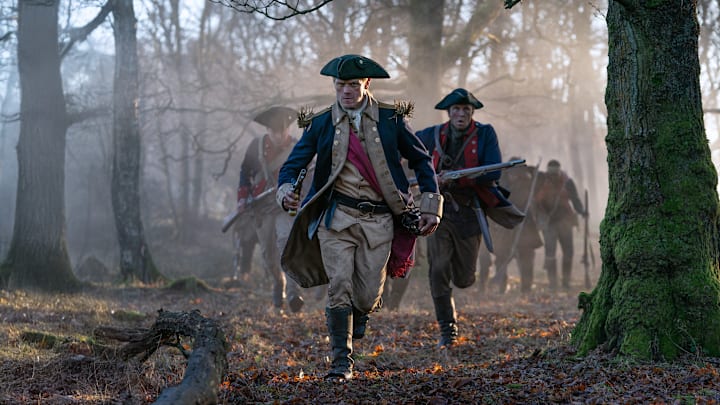The most recent episode of Outlander, "Ye Dinna Get Used to It," featured some major turns for the characters, including a reunion between Jamie, Claire and Lord John Grey as well as a dinner with famous historical figures like George Washington and the Marquis de Lafayette. It was also a special episode because it was written by Diana Gabaldon, the author of the Outlander book series. This is the third episode she's written in the history of the series, and she talked about the process to Parade.
“They did change quite a bit from the first draft, but largely to change emphasis (less time devoted to William [Charles Vandervaart] and Jane [Silvia Presente], more to Hal [Sam Hoare] and John, cut down a lot of the Bree [Sophie Skelton]/Rob Cameron [Chris Fulton] stuff (which I didn't object to), rather than plot," Gabaldon said. “Some lines were changed—when Claire (book) sees Jamie in his new uniform and he asks whether he looks decent to inspect troops, she replies, ‘You look like bloody Mars, god of war. You're likely to frighten your men.’ To which he replies, ‘I want them frightened of me. It's my best chance of getting them out of this alive.’ That was (I believe) changed to JAMIE: ‘Do ye like it? CLAIRE: ‘I'd be lying if I said I didn't.’"
The book line is certainly more colorful, isn't it? “There's nothing 'wrong' with either one; it's just where you want to place the focus of a scene or story, and in some contexts, one version might be better for the other medium," Gabaldon continued. "I have all the room I need to do just about anything I want; I can take the time to show Jamie's uncertainty about leading a much bigger group of men than he ever has, under urgent conditions. The show can't, because they don't have room. If they have to pick and choose between the elements of a book-scene (and they do), they'll usually go for the briefest/most condensed version.”
It sounds like the show did rather a lot of condensing, but that's something Gabaldon has made peace with; after all, Outlander has been on the air for seven seasons now, and she's gotten used to the producers abbreviating her work, whether that means her books or her screenplays.
When Outlander speeds things up and simples things down for TV
Take the scene where Jamie, Claire, and Lord John Grey arrive at some kind of reconciliation; a few episodes ago, Claire and Lord John slept together out of grief when they both thought that Jamie had died. When he turned up alive, he was in no mood to hear explanations, and beat up Lord John for sleeping with his wife.
“Well, again, this is the show condensing and abbreviating what is (in the book and the original script) a more complex conversation,” Gabaldon said. “They need to fix the situation (at least temporarily) and get on to the next major bit. Speaking generally, though, Lord John feels (very justifiably) affronted by Jamie's beating him to a pulp. Jamie may be superficially regretful, but the bloody Highlander and possessive male is bubbling along just below the surface, and he's too honest to tell social lies. Claire knows both men much too well at this point to expect that things will immediately go back to normal, much as she'd like them to. At the moment, she'll accept anything that lets them have a conversation.”
And finally, there's the scene where George Washington and the Marquis de Lafayette, real historical figures both, have dinner in Lord John's dining room. In a quote directly from Gabaldon's book, Washington says, "This dinner won't make the history books," which is amusing if not historically accurate.
“Well, Washington's line isn't something either Washington or I would actually have said (for assorted reasons; Washington and his generals were a whole lot more concerned about survival than with how they'd look 200 years hence, and by and large, you really shouldn't pull the reader/viewer out of the moment), but it's mildly funny." Gabaldon said. "I liked Lafayette a lot."
"When I do dialogue (in the book) for a character who was a real person, I try to find as much as I can of what they actually _did_ say, especially if they wrote letters or journals that have been preserved or quoted—and beyond that, to at least superficially understand both what made that person tick, and the style of their speech. The show writers don't have the time or resources to do that; their dialogue has to be very condensed. Generally, they do a good job, and occasionally they'll do something that makes sense in their context but is way off historically (either in terms of fact, or using a too-modern figure of speech, or something that (I know) a particular character Just Wouldn't Say (for reason X, Y and Z).) When this happens, I tell them about it, and about half the time they fix it."
New episodes of Outlander air Fridays on Starz. There are two more episodes left until the end of the season. Then begins the wait for the eighth and final season of the show, although Starz will be debuting a prequel series called Blood of My Blood to keep fans entertained in the meantime.
To stay up to date on everything fantasy, science fiction, and WiC, follow our all-encompassing Facebook page and Twitter account, sign up for our exclusive newsletter and check out our YouTube channel.
